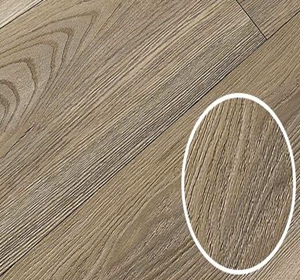
Determining whether glue-down Luxury Vinyl Plank (LVP) flooring is better than click-lock LVP flooring depends on various factors, including installation preferences, stability requirements, and the specific characteristics of each type. Let's delve into the comparison between glue-down and click-lock LVP flooring to understand their respective advantages and considerations.

Glue-down LVP requires the application of adhesive to the subfloor before placing each plank.
This method offers a permanent bond and can result in a more stable and quieter floor.
Installation may be more time-consuming and labor-intensive compared to click-lock systems.
Click-lock LVP features a tongue-and-groove locking system that allows planks to snap together without the need for adhesive.
Click-lock installation is typically faster and more DIY-friendly, making it a popular choice for homeowners looking to undertake their flooring projects.
The glue-down installation provides a solid and stable underfoot feel, especially in high-traffic areas.
The adhesive bond ensures that planks remain securely in place, minimizing the risk of shifting or separation over time.
Glue-down LVP may offer better resistance to moisture intrusion when installed correctly.
Click-lock LVP offers excellent stability when installed properly, thanks to its interlocking mechanism.
However, in areas with high humidity or moisture levels, there is a possibility of slight movement or expansion and contraction of the flooring, which may affect long-term durability.
Glue-down LVP allows for greater flexibility in repair and replacement, as individual planks can be removed and replaced without affecting adjacent ones.
However, repairing glue-down flooring may require specialized tools and expertise to remove adhesive residue and ensure seamless integration of new planks.
Click-lock LVP may pose challenges in repair or replacement, as disassembly of the locking mechanism and adjacent planks may be necessary.
DIY repairs are possible but may be more cumbersome compared to glue-down systems.
The adhesive bond in glue-down LVP helps dampen sound transmission, resulting in quieter floors compared to click-lock systems.
This makes glue-down LVP a preferred choice for multi-level buildings or areas where noise reduction is a priority.
Click-lock LVP may produce more noise when walked on, especially in environments with hard subfloors, due to the absence of adhesive bonding.
Both glue-down and click-lock LVP flooring options offer distinct advantages and considerations. The choice between the two depends on factors such as installation preferences, stability requirements, moisture levels, repair flexibility, and noise reduction needs. Ultimately, homeowners and installers should carefully assess these factors and select the type of LVP flooring that best suits their specific circumstances and preferences.